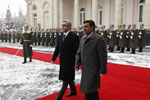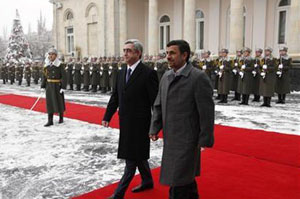 Reuters: With international sanctions squeezing Iran, the Islamic Republic is seeking to expand its banking foothold in the Caucasus nation of Armenia to make up for difficulties in countries it used to rely on to do business, according to diplomats and documents.
Reuters: With international sanctions squeezing Iran, the Islamic Republic is seeking to expand its banking foothold in the Caucasus nation of Armenia to make up for difficulties in countries it used to rely on to do business, according to diplomats and documents.
By Louis Charbonneau
 UNITED NATIONS (Reuters) – With international sanctions squeezing Iran, the Islamic Republic is seeking to expand its banking foothold in the Caucasus nation of Armenia to make up for difficulties in countries it used to rely on to do business, according to diplomats and documents.
UNITED NATIONS (Reuters) – With international sanctions squeezing Iran, the Islamic Republic is seeking to expand its banking foothold in the Caucasus nation of Armenia to make up for difficulties in countries it used to rely on to do business, according to diplomats and documents.
Iran’s growing interest in its neighbor Armenia, a mountainous, landlocked country of about 3.3 million people, comes at a time of rising international isolation for Tehran and increasing scrutiny by Western governments and intelligence agencies of Iranian banking ties worldwide as they attempt to stifle the country’s nuclear program.
The most recent example is British bank Standard Chartered, which has been in the spotlight due to U.S. charges that it hid from U.S. regulators and shareholders some $250 billion of transactions tied to Iran.
An expanded local-currency foothold in a neighbor like Armenia, a former Soviet republic which has close trade ties to Iran and is working hard to forge closer links to the European Union, could make it easier for Tehran to obfuscate payments to and from foreign clients and deceive Western intelligence agencies trying to prevent it from expanding its nuclear and missile programs.
Armenian officials denied illicit banking links to Iran. The country’s central bank issued a press release in response to this article, stating that it requires all banks to scrutinize their transactions to avoid dubious financial exchanges.
“The Central Bank of Armenia will follow its supervision over the behavior and transactions of all financial institutions and their customers in … Armenia, in order to safeguard its financial system from any destabilizing effects,” it said.
While the four rounds of U.N. sanctions remain limited, with only two Iran banks blacklisted by the Security Council, the United States and European Union have implemented much tougher restrictions, sanctioning dozens of banks and other firms and making it increasingly difficult for Tehran to conduct business in U.S. dollars and euros.
A U.N. panel of experts that monitors compliance with the sanctions against Tehran recently submitted a report to the U.N. Security Council’s Iran sanctions committee that concluded Iran was constantly searching for ways to skirt restrictions on its banking sector.
“One state bordering Iran informed the Panel of requests from Iran to open new financial institutions,” the report said. “The requests were not pursued apparently because of that country’s burdensome legislation.”
Several U.N. diplomats familiar with the panel’s work confirmed that the unnamed state was Armenia, where Iran already has banking ties.
Despite Armenia’s denials of illegal banking arrangements, Iran has not given up trying to expand in the country, the diplomats said, and U.S. officials have repeatedly cautioned Armenian colleagues to tighten financial controls.
REPORTS AND DENIALS
Iran’s trade with Armenia, including an oil pipeline that Armenian news reports say should be finished in 2014, requires some form of cross-border banking. Iranian President Mahmoud Ahmadinejad has said that Iran’s annual trade with Armenia is around $1 billion, according to Iranian news reports.
Engaging in transactions with Iranian banks is not a violation of international sanctions as long as it is not linked to Iran’s nuclear or missile programs or companies or individuals under U.S., EU or U.N. sanctions.
Iran insists its nuclear program is peaceful and refuses to shut it down. It says the sanctions are illegal.
But Washington has made clear to governments around the world that trading with Iranian firms that are sanctioned by the United States could lead to a U.S. blacklisting.
A Western intelligence report shown to Reuters, and dated May 2012, said that Iran was searching for “convenient” locations to develop alternative banking relationships away from spy agencies and other international monitoring bodies. It said an expanded presence in Armenia was one of Iran’s goals.
“The Central Bank of Iran (CBI) has been operating for years to establish and develop concealed infrastructures to enable Iran to continue trading with foreign countries, particularly in countries convenient for Iranian activity, such as the UAE (United Arab Emirates) and Turkey,” the report said.
“The increasing pressure on the banks in some of these countries has forced CBI economists to seek financial alternatives in countries that do not work according to the dictates of the West,” it said, naming Armenia as a target.
In addition to Turkey and UAE, diplomats say Iran has been trying to develop financial channels elsewhere to avoid sanctions, focusing on countries like Malaysia, China, India, Brazil and, according to a report in the New York Times last weekend, Iraq.
Iran has used Iraqi banks to move large amounts of cash into the international banking system, prompting private U.S. protests to Baghdad, the Times reported.
Regarding Armenia, the Western intelligence report cited Armenian bank ACBA Credit Agricole Bank, a full-service institution that does business with individuals and companies and had some $574 million in assets last year, as one of Iran’s principal targets.
A Western U.N. diplomat who closely follows the sanctions on Tehran confirmed that ACBA was “a bank that has come up in connection with Iran.” He declined to provide details of any potentially illicit ACBA transactions linked to Iran.
Ashot Osipyan, chairman of the Union of Armenia’s Banks, said it was impossible ACBA had any ties with Iran. “Armenian banks are financing only Armenia’s economy,” he said.
ACBA Chief Executive Officer Stepan Gishian was similarly categorical in his denial of helping Iran skirt sanctions.
“We finance exclusively the economy of Armenia,” he said. “We don’t have any relationship with Iran. We never have, we don’t now and furthermore we don’t plan on becoming a channel for financing Iran. What you’re saying is complete nonsense.”
The central bank statement said that “banks in the Republic of Armenia, including ‘ACBA-Credit Agricole Bank’ CJSC, hold no correspondent accounts with banks and financial institutions in the Islamic Republic of Iran.”
Washington recently raised its concerns with Armenian officials about the possibility that Iran could exploit Armenia to bypass sanctions. Secretary of State Hillary Clinton discussed the issue with President Serzh Sargsyan during a June meeting in Yerevan, a senior State Department official said.
The precise content of the discussions and the outcome were unclear.
CLAMP DOWN
Diplomats and intelligence officials told Reuters that Turkey and the UAE remain Iran’s principal banking connections, while China and India are becoming areas of concern as Tehran now finds it difficult to conduct transactions in U.S. dollars and euros. As a result, it has turned increasingly to doing business in less-traceable local currencies.
But Turkey and the UAE, they say, are not as welcoming these days. The two countries are under intense pressure from Washington and the European Union to clamp down on illicit Iranian commerce connected to a nuclear program that the Western powers and their allies suspect is for producing weapons – a charge Iran denies.
Another bank that has long concerned Western powers is the Armenian branch of Iran’s Bank Mellat, which has been under U.S. sanctions since 2007. While Mellat is not under U.N. sanctions, the Security Council cited it as a problematic bank in the text of its fourth sanctions resolution, passed in June 2010.
“Over the last seven years, Bank Mellat has facilitated hundreds of millions of dollars in transactions for Iranian nuclear, missile, and defense entities,” the resolution said.
Mellat is still functioning in Yerevan, though its activities have drastically decreased due to U.S. and EU sanctions, according to Arakel Meliksetyan, deputy head of the financial intelligence unit at Armenia’s central bank.
The central bank statement said that Mellat’s Armenian assets decreased more than 50 percent from $88 million to $40 million between December 31, 2010 and July 1, 2012.
Mellat is cut off from the U.S., European and other financial markets and has virtually no business with other Armenian banks, Meliksetyan said. Since it was disconnected from the SWIFT system earlier this year, Mellat Armenia is no longer able to send or receive international wire transfers, he added.
He said the bank’s small customers were mainly Iranians doing business in Armenia, Armenians exporting to Iran, Iranians with Armenian backgrounds and students.
The Mellat Armenian branch’s website (www.mellatbank.am) has photos of a brightly lit, ordinary-looking bank with the words “Accuracy, Courtesy, Efficiency” at the top. It lists two men with Iranian names as the general manager and deputy general manager and gives a P.O. box for an address.
Reuters contacted the bank for responses to questions about its activities. After initially agreeing to a face-to-face discussion, the officials said they wanted written questions and have not provided further comment.
Turkey was in a similar position to Armenia’s once. Reuters reported in 2010 that Turkey was becoming a safe haven for Iranian banks. In response to heavy U.S. pressure to cut banking ties with Tehran, Western envoys say, Turkish banks have become much more cautious about doing business with Iranian clients.
U.S. concerns about Armenia’s commitment to implementing sanctions against Iranian banks are not new, according to previously secret U.S. diplomatic cables published by WikiLeaks.
A May 2007 cable from the U.S. embassy in Yerevan, entitled “Armenia Slow To Implement Bank Sepah Asset Freeze,” said that Sepah, an Iranian bank which has been under U.N. sanctions since March 2007, maintained correspondent accounts with the Armenian branch of Mellat in breach of U.N. restrictions.
Another cable from 2008 made clear Washington was still worried: “Poloff (Political Office) requested that the Armenian MFA (ministry of foreign affairs) advise the Central Bank of Armenia to employ extra vigilance in monitoring the financial transaction of the Iranian owned Bank Mellat in Yerevan.”
(Additional reporting by Thomas Grove, Steve Gutterman and Nastassia Astrasheuskaya in Moscow, Andrew Quinn in Washington, Hasmik Mkrtchyan in Yerevan and Andrei Makhovsky in Minsk. Editing by Warren Strobel and Jim Loney)


